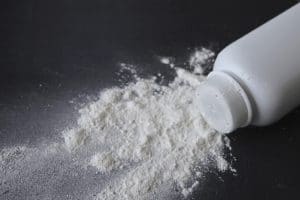More than 1,000 Women Suing Johnson & Johnson Over Talc and Cancer Link
According to a March 31 article in Bloomberg Businessweek, more than 1,000 women and their families are suing Johnson & Johnson for failing to warn them about cancer risks related to use of the company’s talcum powder products. The suits claim that the company has known for years about the association between personal use of its Baby Powder and Shower to Shower bath powder (which was sold to Valeant in 2012) and the increased risk of ovarian cancer. Imerys Talc America, sole supplier of the talc used in the Johnson & Johnson products, is also named in the suits. 
Deane Berg, who was diagnosed with ovarian cancer in 2007, was the first woman to sue Johnson & Johnson for not warning of the risks of talcum powder. Her case went to trial in 2013 and while the jury found Johnson & Johnson was negligent, they didn’t award Berg any damages.
Earlier this year, the family of Jaqueline Fox, who died of ovarian cancer at 59 years old in October 2015, won their suit against the company. Fox had used Johnson & Johnson talc products for personal hygiene since she was a teenager. The St. Louis jury concluded that talcum powder contributed to the development of the disease and that Johnson & Johnson was liable for negligence, conspiracy and failure to warn women of the potential risk of using Baby Powder in the genital area. The verdict included $10 million in compensatory damages and $62 million in punitive damages. Imerys, also a defendant in the suit, was not found liable.
The next trial is scheduled to begin April 11 in a St. Louis circuit court.
A study by British researchers, published in 1971, that analyzed 13 ovarian tumors and found talc particles “deeply embedded” in 10, first raised the possibility that talcum powder could pose a risk. In 1982, a study by Daniel Cramer, an epidemiologist at Brigham & Women’s Hospital in Boston, showed the first statistical link between genital talc use and ovarian cancer. Since that study was published, an additional 20 epidemiological studies have found that long-term perineal talc use increases the risk of ovarian cancer by about 33 percent.
